Search Images
Browse Content (p. 1087)
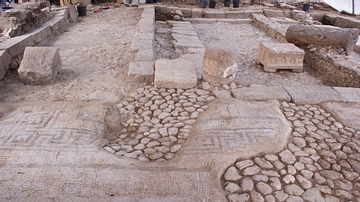
Image
Magdala Synagogue Mosaic
Magdala synagogue of the first century CE with evidence of a mosaic floor and the carved stone in the center area of the synagogue. Under the mosaic a bronze coin of Herod Antipas minted in Tiberias (Year 33 = 29 CE) was found.
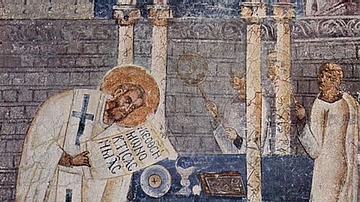
Image
Fresco of Basil the Great
Located at the Cathedral of Ohrid, Macedonia, this fresco, from the 11th century CE, depicts Saint Basil (Basil the Great) blessing gifts in the Divine Liturgy. Basil was born c. 330 CE and died 379 CE.
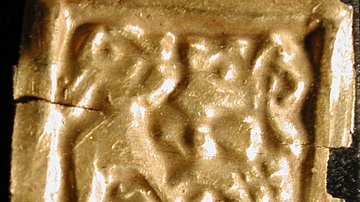
Image
Scandinavian Gold-Foil Picture
Gold-foil picture depicting a couple embracing each other, found in Scandinavia. It is thought to represent the Norse god Freyr and his wife Gerðr united in holy marriage (hieros gamos). These tiny images are known as 'guldgubber' and...
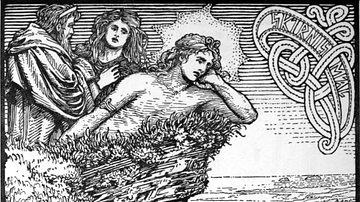
Image
The Lovesickness of Freyr
Artist's depiction showing the Norse god Freyr gazing out from atop Odin's high seat to Jotunheim, realm of the giants, where he espies the giant-daughter Gerðr walking across her garden and instantly falls in love with her. This tale is...
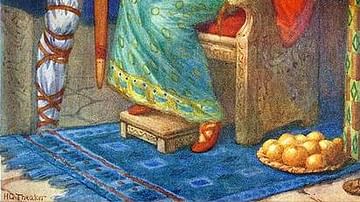
Image
Skírnir and Gerðr
Artist's depiction showing a tale from Norse Mythology recorded in the Skírnismál in which Freyr sends his servant Skírnir to Jotunheim, the realm of the giants, in order to convince the giant-daughter Gerðr to marry Freyr. She refuses, and...
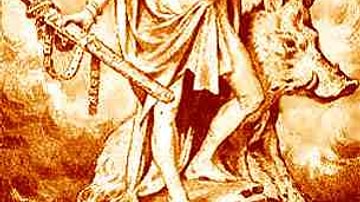
Image
Freyr
Norse god Freyr, here shown alongside the boar – one of his attributes – named Gullinborsti as per Icelandic mythographer Snorri Sturluson (1179-1241). Artwork by Jacques Reich (1852-1923).
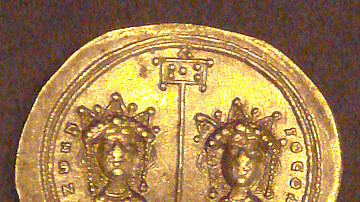
Image
Gold Coin Depicting Zoe and Theodora
Byzantine gold solidus, depicting co-rulers Empress Zoe and her sister Empress Theodora (r. Apr-Jun 1042 CE), from 1042 CE.
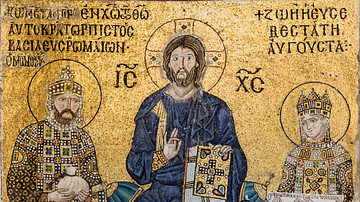
Image
Constantine IX & Empress Zoe
An 11th century CE gold and glass mosaic in the Hagia Sophia of Constantinople depicting Constantine IX Monomachos (r. 1042-1055 CE), Jesus Christ and Empress Zoe (r. 1028-1050 CE).
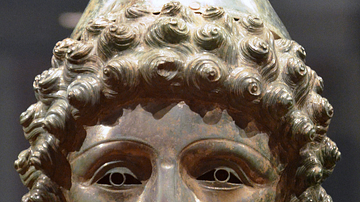
Image
Crosby Garrett Helmet
The Crosby Garrett Helmet, a copper alloy Roman cavalry helmet dating from the 1st half of 3rd century AD, found by an unnamed metal detectorist near Crosby Garrett in Cumbria in May 2010. This photo was taken on the occasion of the Hadrian’s...
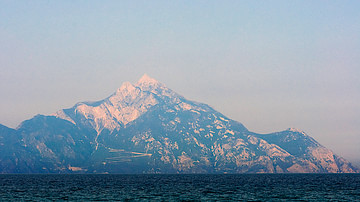
Image
Mount Athos
Mount Athos in northeastern Greece, home of 20 monasteries, the first of which was built probably in the 9th century CE.